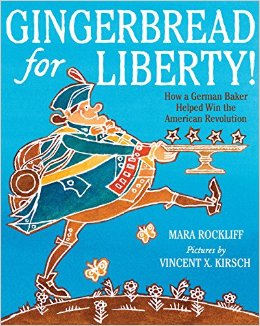

Meet Christopher Ludwick….
Gingerbread for Liberty : How A German Baker Helped Win the American Revolution
by Mara Rockliff
illustrated by Vincent Kirsch
I love picture books that put a human face on history. And Gingerbread for Liberty attracted my attention for that very reason.
Yet also sheepishly, it did also because I happen to love gingerbread, plus the historical character of the book’s baker, a German-born American patriot, named Christopher Ludwick, immediately put me in mind of a third generation real German baking family that I happen to know.
They truly are the German equivalent of the extended Italian family of TV’s Cake Boss fame.
And they, like the picture book’s Christopher Ludwick, are the real deal, descended from a grandfather who arrived here from Germany, with no resources except drive and determination.
He built with a friend, and later, passed on to one son, and eventually to grandsons, a generational baking business that from 1947 to the present, continues to adapt and thrive with two grandsons carrying on their grandfather’s German legacy of leavening.
Mara Rockliff has researched a unique picture book with another bakery backstory on someone who had a quite amazing effect on the positive outcome of the Revolutionary War for General George Washington.
He was befriended by a German-born baker named Christopher Ludwick that arrived in Philadelphia with dreams, and a ton of good will for everyone. Along with Vincent X. Kirsch’s cinnamon-infused toned drawings, this picture book fairly sends the aroma of Ludwick’s Philly gingerbread through the air.
Known for the best gingerbread in Philadelphia, Ludwick is determined that hunger will not be a factor in Washington’s troops loss in the fight for independence from Britain.
He feeds the hungry children that follow the aroma of sweetly spiced gingerbread to his shop with the bellowing boom of, “No empty bellies.” Not in my America”
As is often the story, in his youth Ludwick was a “young and hungry” immigrant that had come to the New World to open a bakery and sate his own hunger.
But here’s where the story takes a remarkable turn. His own success in America, is not enough for him, but only finds him eager to participate in the cause of liberty, independence and freedom that the fledgling nation is struggling to achieve.
Yet, how can an aging and overweight baker possible join the fray?
Why, with food, of course!
Leaving his bakery, he visits General Washington and finds the food situation for the colonial troops fraught with problems; as in a lack of same.
The familiar refrain that fills the book, continues from the German baker’s booming, “No empty bellies here. Not in my America.”
Food is not the only problem facing Washington. From across the ocean, come masses of Hessian troops, descending on the colonies.
Can a German-born baker help stem the tide, figuratively and furtively? By stealth, and with Washington’s approval, Ludwick visits and fills the hungry Hessians with tales of freedom. After all, they are hired troops of his own former homeland.
What happens next is truly a baker’s delight, for Ludwick treats these enemy Hessians with care and concern, and ideas of American democracy so much so, that many desert. Head scratching ensues across the pond.
Be sure to read the Author’s Note of this benign and benevolent baker who kneads some “six thousand pounds of bread to feed their former enemies.”
Childless, his philanthropy extended to paying for the education of poor children, since public education was non-existent at the time.
His will was a legacy of paid schooling for the poor of Philadelphia.
Today, the Christopher Ludwick Foundation continues to give grants of some $200,000 yearly to educate needy students of Philly.
Where did the primary source historical accuracy of this picture book spring from? Why, from none other than Ludwick’s friend, a Dr. Benjamin Rush, Founding Father and signer of the Declaration of Independence.
Great primary source, I’d say for a window into what one person can do to change the tide of not only his own history, but that of a nation and successive generations of Americans in Ludwick’s adopted homeland of America.
And, please do try with kids, the simple gingerbread cookie recipe found on the front end cover of this picture book about a German immigrant “gingerly” pitching in with heart and hands to help both hungry sides embroiled in the War for Independence.
Whether spoken in English or German, three words were the hallmarks of that war, and, in Gingerbread for Liberty, they are shared with the reader in both languages: Revolution ( Ger. – Befreiung), Independence ( Ger.- Unabhangigkeit), and Liberty (Freiheit). I am working on the pronunciations.
Christopher Ludwick made sure those words literally flourished, and were surely fed by his own bread, baked up in ovens he both built and hauled to feed the troops.
After looking through this picture book, your young reader will surely think Christopher Ludwick deserves a pretty sweet page in the history of the birth of our nation.
